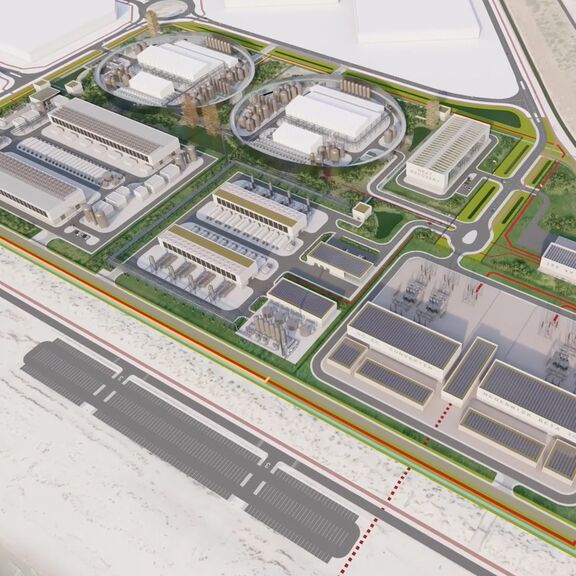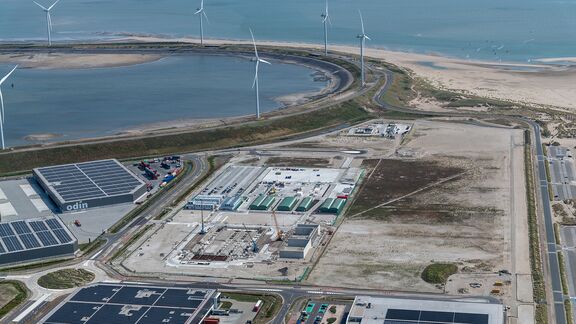
Realisation of green energy generation park (hydrogen conversion park)
The Port of Rotterdam Authority is working with partners on the construction of a hydrogen system. With this system, it aims to enable industry and transport to switch from fossil fuels to green energy in the form of green hydrogen.
The Port of Rotterdam wants to become an important hub in the hydrogen economy as Europe's Hydrogen Hub. It will achieve this by importing large volumes of green hydrogen from countries where there is space to generate solar, wind and water power and by producing green hydrogen with wind energy from our own North Sea coast. Hydrogen plants are being built for this purpose.
Green hydrogen offers a solution for plants that want to reduce their consumption of fossil fuels and the resulting carbon emissions. This is because green hydrogen can be generated with zero carbon emissions through sustainable energy production, such as wind and solar power. In addition, no carbon emissions are released when the hydrogen is used.
What are the plans?
On the Maasvlakte, we are realising a hydrogen conversion park with various partners. The aim is to have the park, which will be located in the port and have a capacity of 2.5 gigawatts of hydrogen plants, completed by 2030. Four hydrogen plants will be constructed on 24 hectares, which will convert green energy from offshore wind parks into green hydrogen through electrolysis. All available areas of the park are reserved by parties such as Shell and Air Liquide. In addition, TenneT will build a landing point for offshore wind power. Wind turbines in the North Sea supply green energy, which is necessary for the production of green hydrogen.
When will it happen?
The road infrastructure was fully completed in spring 2023. Construction of the first 200 MW hydrogen factory for Shell, the Holland Hydrogen 1, has been underway since 2022. It will likely be completed in 2025, after which construction of the other plants will begin, meaning the entire park will be operational by 2030.

Challenging infrastructure puzzle
Fast-paced developments in hydrogen mean that space is needed for hydrogen plants, also known as electrolysers. Through the construction of this conversion park, the Port Authority is making this space available. The plants planned in the short term have a capacity of up to around 250 megawatts. Several parties have the ambition to upgrade to a plant with a capacity of around 1 gigawatt some time around 2030. Each plant requires a considerable amount of space and needs to be connected to the national hydrogen network, electricity from the sea and other ‘utility’ connections. During the construction of the conversion park, the Port Authority is overseeing the development process, including the long-term developments.
Smart construction in collaboration
The Port Authority endeavours to make the construction of a hydrogen plant as easy as possible for the customers. Therefore, we are designing the layout of the hydrogen conversion park, ensuring that the zoning plan is in order and that the road infrastructure is ready and we are determining where the pipelines should be laid in consultation with the customers. We are also working with parties such as Gasunie, TenneT and Evides to keep the costs of the ‘utility’ connections as low as possible by creating connections in locations that are accessible to all customers. During the execution of the various projects, we are bringing the parties together to ensure this is handled in a safe manner.